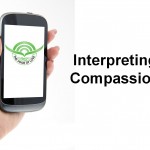I am fascinated by the voices of trauma-informed therapists. Their voices can be gentle and as undulant as a summer stream.
I think many trauma-informed therapists use their voice as an instrument of healing because they are so exquisitely sensitive and attuned to the well being of survivors.
It has been my privilege to work with a few extraordinary therapists who contribute their work pro-bono to The Voice of Love. As a trainer of interpreters, I have learned so much from them. Their voices are, I think, far easier to interpret for than the survivor’s, a contrast that poses a dilemma. If the interpreter fully conveys the tone of a survivor in crisis and pain—doing so can hurt the interpreter, and even the survivor. How do interpreters handle these situations? How should they?
Just today in my inbox was an email from a national and respected court interpreting expert who wrote: Interpreters should reflect the tone, but should not try to reproduce the victim’s statements in their full intensity, volume, etc. We are interpreters – not actors.
This is true. Yet in a way we are actors. Whoever interprets must somehow enter the very being of the speaker in some way because we don’t interpret words. We interpret meaning. Context, body language, cultural subtexts, social cues and, yes, tone of voice all contribute to that meaning. Interpreters have to engage in the almost magic act of shunting aside their own sense of self to enter the psyche of another human being—at least enough to extract the intended meaning of the utterance.
This is impossible, of course. Yet interpreters try. And nowhere, I believe, is this attempt a deeper risk or greater challenge than when interpreting for survivors of extreme trauma. It’s an exquisite balancing act. On the one hand, you interpret for meaning; you then reflect that meaning in another language. On the other hand, you are supposed to avoid traumatizing yourself.
There is a growing body of research that suggests if you empathize too much with someone who is traumatized, you can experience the trauma vicariously. So while for interpreters the main answer to this dilemma lies in specialized training, I also think we can focus in a positive way on our contribution to the healing process.
Whether that healing comes in the compassion of a therapist’s voice, or an attorney’s ability to bring justice and hope to an asylum seeker, or a doctor’s treatment plan, at the end of the day it is all healing. The interpreter is a conduit of compassion.
In that lovely act lies some protection for the interpreter. Yes, specialized training helps. It is crucial. We can learn trauma-informed strategies to protect ourselves and interpret more effectively. But if we can also hold on to the joyous fact that we are contributing to the gift of healing, perhaps we can learn to protect ourselves on some deeper level.
In this way, interpreters can become the voice of healing and compassion. The voice of love.
Marjory Bancroft – Executive Director, VOICE OF LOVE







5 Comments
Ona says:
April 2, 2015 at 4:55 PM
We’re a bunch of volunteers and opening a new
scheme in our community. Your website offered uus with helpful
information to woirk on. You have done a formidable process and our entire community will be thankful to you.
Mbt Shoes says:
April 2, 2015 at 6:58 PM
Have you ever considered creating an e-book or guedst authoring on other
websites? I have a blog basd on the same ideas youu discuss
and would love to have you share some stories/information. I know my visitors would enjoy your work.
If you are even remotely interested, fel free to send
me an e-mail.
Voice of Love says:
April 14, 2015 at 9:09 AM
Hello and thanks for your message! Do you have an idea for a blog entry on issues related to interpretation for victims of torture and war trauma? Send it to us and we will review it.
mbt womens shoes says:
April 2, 2015 at 6:58 PM
My spouse and I absolutely love your blog and find the majority oof your post’s to be what
precisely I’m looking for. Do you offe guest writers tto write content for you?
I wouldn’t mind publishing a post or elaborating on a
few of the subjects you write concerning here.
Again, awesome site!
Voice of Love says:
April 14, 2015 at 9:08 AM
Hello and thanks for your message! Do you have an idea for a blog entry on issues related to interpretation for victims of torture and war trauma? Send it to us and we will review it.